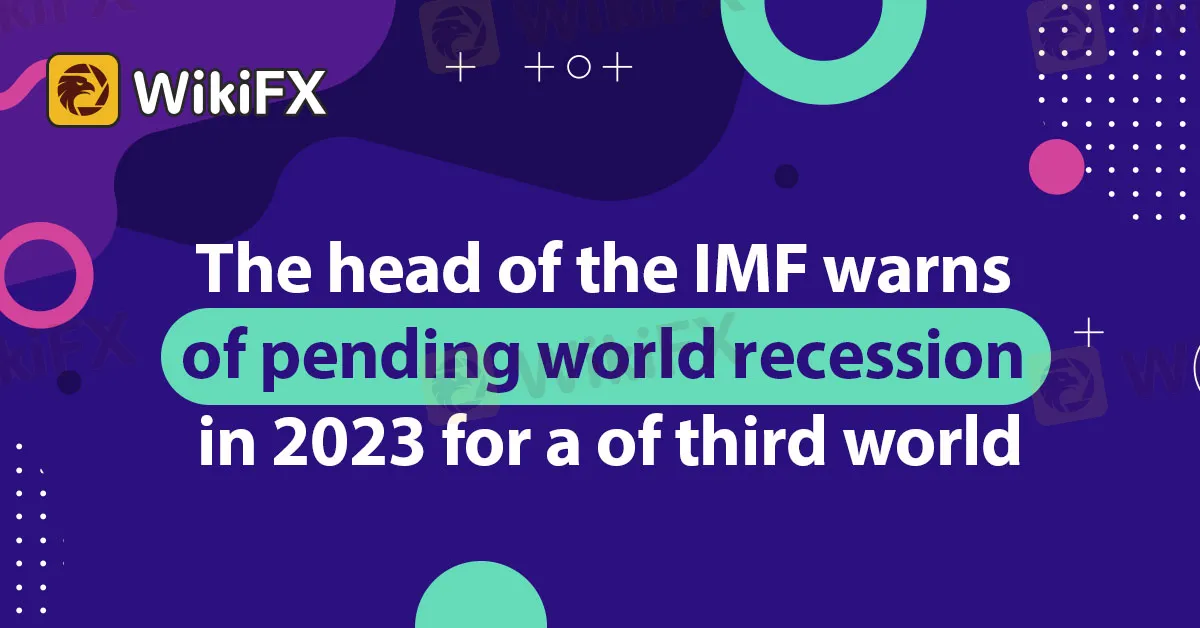简体中文
繁體中文
English
Pусский
日本語
ภาษาไทย
Tiếng Việt
Bahasa Indonesia
Español
हिन्दी
Filippiiniläinen
Français
Deutsch
Português
Türkçe
한국어
العربية
The head of the IMF warns of pending world recession in 2023 for a of third world
Abstract:The past year has proven to be havoc for economies all around the world. The consequences of COVID-19 fiscal policies, the war in Ukraine, and the rising cost of living caused by the supply shock caused by Sanctions against Russia due to its invasion of Ukraine. It turns out we are not out of the woods yet as IMF leader Kristalina Georgieva states that a third of the world may be subject too a recession. What does this mean for us traders and how should we adjust our expectations for the trading year 2023.

The past year has proven to be havoc for economies all around the world. The consequences of COVID-19 fiscal policies, the war in Ukraine, and the rising cost of living caused by the supply shock caused by Sanctions against Russia due to its invasion of Ukraine. It turns out we are not out of the woods yet as IMF leader Kristalina Georgieva states that a third of the world may be subject too a recession. What does this mean for us traders and how should we adjust our expectations for the trading year 2023.
Why are in at threat of a recession
The consequences of COVID-19 fiscal policies caught up to us last year and will continue to cause havoc within economies. Many governments were forced to hand out financial aid to its citizens when they could not work during the pandemic. The issue here is that there was money supply injected in the economy without any growth in business or economic growth realized hence we now had more money within economies but we also still had limited services. With an over supply of money and limited services, people tend to change to higher prices as people will bid up prices to receive the limited serves. This is bound to cause inflation (as we saw in 2022).
The supply shocks of necessary items such as oil and grains due to the Russia- Ukraine war also threw a spanner into the works. As there was already additional money injected in economies, the supply shock of essential services also contributed to advancing inflation. The price of oil was hiked extensively as there was limited supply of it as Russia's oil clients stopped purchasing oil from Russia in reaction to the war. There are a number of countries scrambling to fix this supply issue however there were a number of countries that were dependent on Russian oil supply for years on end. Finding a replacement for that supply will prove difficult and hence why the world is predicted to head towards a recession.
Another issue is the current state of affairs in China as it's economic progress has been slowed by COVID 19 social distancing policies. The Chinese government had taken a strong stance against COVID-19 within its borders as they have been subjecting its massive cities to social distancing procedures. Some of these areas support international businesses and trade, hence the shut down of these areas has caused a slow in economic growth for China. Much of these restrictions were taken down after massive protests by citizens, however there has been a resurgence in the number of COVID-19 infections and death in the country and so it is uncertain how the government is yet to act to this occurence.
How to prepare as traders
We should be on the look at two important aspects this year 1) the Russia- Ukraine war, and 2) China's response to COVID-19. If these two events continue on the trajectory that they are on at the moment we can expect the recession prediction to prove true. We should be on the watch for the USD, the EURO and the YEN as these currencies are part of the biggest economies which are certainly going to be impacted by these economic events. The value of these currencies may drop throughout the year so be ready to short them.

Disclaimer:
The views in this article only represent the author's personal views, and do not constitute investment advice on this platform. This platform does not guarantee the accuracy, completeness and timeliness of the information in the article, and will not be liable for any loss caused by the use of or reliance on the information in the article.
Read more

U.S. Stocks Bounce Back for Two Consecutive Days, Is a Positive Outlook Ahead?
The U.S. stock market has rebounded for two consecutive days. Could this signal a potential turning point, or is it just a temporary uptick? Let's explore the market movements, their underlying causes, and how investors should respond.

U.S. Consumer Weakness: Is It Good or Bad?
U.S. retail data for February came in below expectations, raising concerns about slowing consumer spending. Does this signal the beginning of an economic slowdown, or is it just a temporary fluctuation? Let's dive into the analysis.

Acuity Trading and interop.io have joined forces
Acuity Trading and interop.io have joined forces to streamline financial data integration, enabling traders, brokers, and institutions to access real-time market intelligence without disrupting their existing systems. This partnership represents a significant step forward in addressing one of the financial industry’s most persistent challenges—integrating vast amounts of market data from diverse sources.

TopFX Launches New Website & Brand Identity for Enhanced Trading
TopFX unveils a redesigned website and brand identity, offering faster trading, advanced technology, and institutional-grade liquidity for serious traders.
WikiFX Broker
Latest News
Beware: Forex Investment Fraud Targeting Low Income Earners
Central Bank Policies,Forex Markets and Gold Prices
These 24 Crypto Scams Are Accelerating the Theft of Your Assets
Beware of Fake 'Educational Foundations' Targeting Crypto Investors, Warns North Dakota Regulator
49 Foreigners Arrested in Illegal POGO Raid in Pasay City
We Asked Grok About Illegal FX Brokers—Here’s What It Revealed
Exposing Trading Academy Scams: How Aspiring Traders are at Risk
Online Investment Scams on the Rise: How Two Victims Lost Over RM100K
Vanished Savings: How One Woman Lost RM412,443 to an Online Scam
Investor Alert: FCA Exposes 9 Unregistered Financial Companies
Currency Calculator






